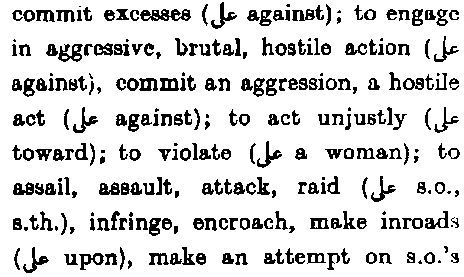@ApostateProphet tried to correct Professor @KhalilAndani when he stated that the Quran forbids aggression in the following verse:
[Q 2:190]
Fight in God’s cause against those who fight you, but do not aggress (lā taʿtadū), for God does not love aggressors (muʿtadīn). 1/
[Q 2:190]
Fight in God’s cause against those who fight you, but do not aggress (lā taʿtadū), for God does not love aggressors (muʿtadīn). 1/
AP looked at an English translation, which translated it as "transgression." But, this translation only works if by this one means transgression against the law of peace/sanctity (ḥurmat al-nafs), which then triggers qiṣāṣ (proportionate retaliation). 2/
In other words, it is a first transgression, or, in other words, aggression. In any case, AP could simply have looked at an Arabic dictionary, even the many online resources, as follows: 3/
Aratools.com

Aratools.com


The Quranic word, taʿtadū, is form VIII of the word iʿtadā, which means "commit a violation of, commit an aggression against." (Notice: commit violation of here refers to violating the peace/sanctity). 4/
corpus.quran.com and almaany.com

corpus.quran.com and almaany.com


As Toshihiko Izutsu writes:
"Muʿtadī is a participial form of the verb iʿtadā which means approximately ‘to pass beyond one’s proper limit’, and thence ‘to act aggressively and unjustly against someone.’ ..." (Ethico-Religious, 172) 6/
"Muʿtadī is a participial form of the verb iʿtadā which means approximately ‘to pass beyond one’s proper limit’, and thence ‘to act aggressively and unjustly against someone.’ ..." (Ethico-Religious, 172) 6/
Izutsu further argues that the words “do not aggress” (lā taʿtadū) in verse 2:190 "put in a more concrete way, would mean, ‘Do not challenge your enemy to fight from your side.’" (Ibid.) In other words, do not initiate hostilities. 7/
This is obvious from the Quranic passage itself; see the very next verse:
[Q 2:191] But do not fight them near the Sacred Masjid until they fight you with you there. But if they fight you, then fight/kill them.
In other words, if they initiate the fighting against you...
8/
[Q 2:191] But do not fight them near the Sacred Masjid until they fight you with you there. But if they fight you, then fight/kill them.
In other words, if they initiate the fighting against you...
8/
There are so many other verses that reinforce this that it is amazing to me that @ApostateProphet was not familiar with them: Q 22:39, 42:41, & 2:85, the last of which, for example, uses a similar word, ʿudwān (aggression). 9/
I discuss this in depth on @DerekPodcast's Mythvision show:
I also debated Robert Spencer on this topic & he withered in front of me such that he did not even try to contest my Quranic reading. 10/
I also debated Robert Spencer on this topic & he withered in front of me such that he did not even try to contest my Quranic reading. 10/
• • •
Missing some Tweet in this thread? You can try to
force a refresh

 Read on Twitter
Read on Twitter









